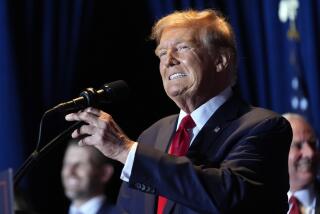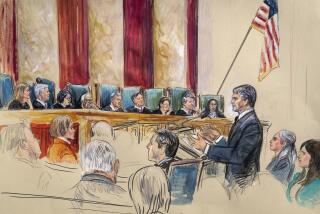President Obama’s odd definition of judicial activism
President Obama is a lawyer by training and a former professor of constitutional law, and I am neither. Still, I can’t help but think his remarks today about “judicial activism” and the Supreme Court’s review of the 2010 healthcare reform law were hyperbolic.
At a news conference held jointly with Canadian Prime Minister Stephen Harper and Mexican President Felipe Calderon, Obama was asked, “[H]ow would you still guarantee healthcare to the uninsured and those Americans who’ve become insured as a result of the law” if the measure’s individual mandate were declared unconstitutional?
Obama quickly recapped the legal and policy arguments for maintaining the law, then said:
I’m confident that the Supreme Court will not take what would be an unprecedented, extraordinary step of overturning a law that was passed by a strong majority of a democratically elected Congress. And I’d just remind conservative commentators that for years what we’ve heard is, the biggest problem on the bench was judicial activism or a lack of judicial restraint -- that an unelected group of people would somehow overturn a duly constituted and passed law. Well, this is a good example. And I’m pretty confident that this Court will recognize that and not take that step.
The first problem with that statement is that the law was passed not by a strong majority of Congress, but by a virtually party-line vote. Had Democrats and left-of-center independents not controlled 60 votes in the Senate, the measure wouldn’t have made it out of that chamber. Similarly, if Republicans had been in the majority in the House, there’d be no such thing as “Obamacare.”
More important, the margin of passage doesn’t make a whit of difference to the law’s constitutionality. The Supreme Court is the only arbiter of that, at least in a nation where Marbury v Madison is the law of the land. (In other words, a country without a President Gingrich.)
And that’s a good thing. One of the best features of the amended Constitution is the extent to which it protects minorities from the tyranny of the majority.
Defenders of the law argue that the Supreme Court has given Congress broad leeway to regulate markets since early in the 20th century. From their point of view, it would be judicial activism to reverse those precedents. But the court can throw out the individual mandate without erasing any earlier rulings.
Instead of accepting the administration’s argument that Congress was regulating healthcare and how people pay for it, the justices could decide that Congress was regulating a specific product -- health insurance -- that millions of people don’t purchase today. And they could then find that Congress doesn’t have the power to force people into markets they’re not already participating in.
The justices acknowledged during last week’s oral arguments that the case raised the specter of judicial activism, but not on the question of the mandate. Instead, some justicies saw it as a potential abuse of judicial power to throw out the entire law if only the mandate were deemed unconstitutional. Others, meanwhile, questioned whether it would be an abuse of judicial power to overturn the mandate but leave much or all of the rest of the law intact, considering how central the mandate was to the measure’s insurance reforms and how different the law’s effects would be.
It seems safe to expect more discussion of that issue when the court issues its ruling later this year. And if the court throws out the mandate, some of the dissenters are sure to argue that the majority ignored the weight of precedent. But to argue as Obama did that the mandate should be preserved because it was “passed by a strong majority of a democratically elected Congress” just seems contrary to history.
ALSO:
McManus: The nuclear countdown in Iran
‘Obamacare’: Nothing without the mandate?
More to Read
A cure for the common opinion
Get thought-provoking perspectives with our weekly newsletter.
You may occasionally receive promotional content from the Los Angeles Times.






